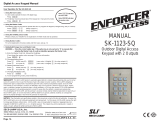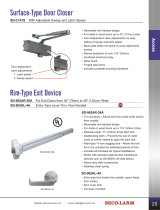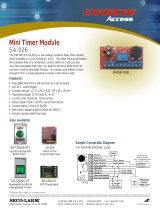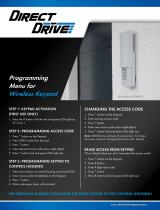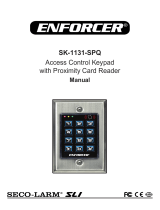Page is loading ...

ENFORCER FLUSH-MOUNT OUTDOOR ACCESS KEYPAD
QUICK REFERENCE GUIDE
1. Using the User Codes:
A. User codes operate the door (4-8 digits long).
Press u u u u
B. The # key must be pressed also if the keypad is in manual-entry mode.
Press u u u u #
2. Using the Master Code:
The Master Code can be used to operate the door or program the keypad (4-8 digits long, see section 5 below).
Press x x x x # 1 (Output #1)
Press x x x x # 2 (Output #2)
3. Using the Inhibit/Lockout Code
Please contact your installer for an explanation of inhibit mode and its operation.
4. Using Duress Codes
For a full explanation of duress codes and their uses, see pg. 12.
5. Delete/Add/Change User and Master Code
WARNING – Press the correct option key. If the option key is not used and a “0” is pressed after entering the
Master Code, it could accidentally reprogram the Master Code.
A. Enter the Master Code first, followed by the key.
(If you forgot the master code, see page 15 for more information.)
Press x x x x
B. Changing/Adding Users:
Press 1 00-99 (user ID) u u u u (user code, 4-8 digits) # (for output #1)
Press 2 0-9 (user ID) u u u u (user code, 4-8 digits) # (for output #2)
C. Deleting Individual Users:
Press 1 00-99 (user ID) # (for output #1)
Press 2 0-9 (user ID) # (for output #2)
D. Changing the Master Code:
Press 0 x x x x # (Where x x x x is the new master code.)
E. To exit programming mode, press the key.
LIFETIME LIMITED WARRANTY This SECO-LARM product is warranted against defects in material and workmanship while used in normal service for the
lifetime of the product. SECO-LARM’s obligation is limited to the repair or replacement of any defective part if the unit is returned, transportation prepaid, to
SECO-LARM. This Warranty is void if damage is caused by or attributed to acts of God, physical or electrical misuse or abuse, neglect, repair, or alteration, improper or
abnormal usage, or faulty installation, or if for any other reason SECO-LARM determines that such equipment is not operating properly as a result of causes other than
defects in material and workmanship. The sole obligation of SECO-LARM, and the purchaser’s exclusive remedy, shall be limited to repair or replacement only, at
SECO-LARM’s option. In no event shall SECO-LARM be liable for any special, collateral, incidental, or consequential personal or property damages of any kind to the
purchaser or anyone else. This lifetime limited warranty is for products sold and installed in the United States and Canada. For all other countries, the warranty is 1
(one) year.
NOTICE The information and specifications printed in this manual are current at the time of publication. However, the SECO-LARM policy is one of continual
development and improvement. For this reason, SECO-LARM reserves the right to change specifications without notice. SECO-LARM is also not responsible for
misprints or typographical errors. Copyright © 2009 SECO-LARM U.S.A., Inc. All rights reserved. This material may not be reproduced or copied, in whole or in part,
without the written permission of SECO-LARM.
U.S.A., Inc.
16482 Millikan Avenue, Irvine, CA 92606 Website: www.seco-larm.com
PIHAK1
mi-SK-1123-FQ.docx
Note: u u u u
indicates user code.
Note: x x x x
indicates master code.
MANUAL
SK-1123-FQ
Flush-Mount Outdoor Access Keypad
Page 16
Also available from SECO-LARM:
SK-1011-SQ
SK-1131-SQ
Indoor Keypads
Outdoor Keypads
SK-2123-SQ
SK-3123-SQ
SK-1123-SQ

ENFORCER FLUSH-MOUNT OUTDOOR ACCESS KEYPAD
ENFORCER FLUSH-MOUNT OUTDOOR ACCESS KEYPAD
SECO-LARM U.S.A., Inc.
SECO-LARM U.S.A., Inc.
®
®
4
3
/
4
‖
(120mm)
1
15
/
16
‖
(46mm)
TABLE OF CONTENTS
Introduction...........................................................................................................................................
Dimensions...........................................................................................................................................
Unique Features ...................................................................................................................................
Wiring – Basic Diagram ........................................................................................................................
Specifications .......................................................................................................................................
Output 2 (NPN Transistor Open Collector) ...........................................................................................
Wiring – Example, with Connection to Lock Device and Alarm Arm/Disarm ........................................
User Code Worksheet ..........................................................................................................................
Wiring – 2 Keypads with Mantrap Interlock ..........................................................................................
Wiring – Auxiliary Accessories .............................................................................................................
Programming Notes .............................................................................................................................
LED Indicators ......................................................................................................................................
Preparing to Program ...........................................................................................................................
Getting Started .....................................................................................................................................
User Programming ...............................................................................................................................
Installer Programming ..........................................................................................................................
Reprogram the Keypad (Select Data) ..................................................................................................
Reprogram the Keypad (Complete Data Refresh) ...............................................................................
Delete User ..........................................................................................................................................
Master Code Bypass (DAP jumper) .....................................................................................................
Quick Reference Guide ........................................................................................................................
2
2
3
4
5
6,7
7
8,9
10
11
12
12
13
13
13
14
15
15
15
15
16
INTRODUCTION
The SK-1123-FQ is the ideal keypad for office, commercial, and home security installations. This
self-contained security keypad has a built-in 5-Amp relay output and a 100mA transistor ground
output for maximum flexibility when connecting to electronic door strikes, door alarms, door chimes,
alarm control panels, or other security and access control applications. The outputs can be
programmed for timed (1~999 seconds) or ON/OFF operation.
The SK-1123-FQ can be programmed for up to 100 4-digit to 8-digit user codes for the primary
output, and up to 10 4-digit to 8-digit user codes for the secondary output. All programming and
code information is stored in non-volatile EEPROM memory to protect the data in case of
power loss.
DIMENSIONS
PARTS LIST
Keypad x 1
Diode x 1
Security screw x 2
Security wrench x 1
REPROGRAM THE KEYPAD (SELECT DATA)
To change certain data in the keypad (such as to delete or change user codes), do the following:
1. Enter programming mode by keying in the master code and the key:
x x x x The keypad is now in the programming mode.
2. Use the programming instructions on page 13 and 14 to make desired changes to the keypad’s data.
3. Exit the programming mode by pressing the key.
REPROGRAM THE KEYPAD (COMPLETE DATA REFRESH)
Sometimes it may be necessary to completely erase all current data (except the master code) and input new data. An
example of when this may be necessary is the sale of a protected building to a new owner. In such a situation, do the
following:
1. Enter the programming mode by keying in the master code and the key, then enter the refresh code, 8 9 0 1
and the # key:
x x x x The keypad is now in the programming mode.
8 9 0 1 # All old data is cleared and the keypad is ready for new data.
Note: The master code does NOT change.
2. Use the programming instructions on pages 13 and 14 to enter the keypad’s data.
3. Exit the programming mode by pressing the key.
DELETE USER
To delete a user who no longer has authority to enter the protected area:
1. Enter program mode by keying in the master code and the key:
x x x x The keypad is now in the programming mode.
2. Enter the output #, user ID number, and the # key.
To delete user ID 05 from output #1, press 1 0 5 #
To delete user ID 1 from output #2, press 2 1 #
3. Exit the programming mode by pressing the key.
MASTER CODE BYPASS (DAP JUMPER)
If the master code has been forgotten or does not work, use the DAP
(direct access to program) jumper to override the forgotten code and
permit direct entry into the programming mode as follows:
1. Disconnect the power supply.
2. Move the DAP jumper from OFF to ON.
3. Reconnect the power supply.
The keypad will start beeping.
4. Move the DAP jumper back to the OFF position. The
keypad will stop beeping as soon as the jumper is
removed.
5. Key in a new master code as follows:
Option*
Key in New Code
Confirm
Exit
0
x x x x
#
Note: DAP reset does not change any previously configured settings.
DAP will only give direct access to programming by bypassing the
master code requirement.
3
1
/
8
‖ (80mm)
1
23
/
32
‖
(31mm)
2
5
/
8
‖
(66.5mm)
Page 2
Page 15
5
/
8
‖ (15mm)
*Zero ―0‖ is for new master code only; see page 13 and 14 for
other options.

ENFORCER FLUSH-MOUNT OUTDOOR ACCESS KEYPAD
ENFORCER FLUSH-MOUNT OUTDOOR ACCESS KEYPAD
SECO-LARM U.S.A., Inc.
SECO-LARM U.S.A., Inc.
®
®
Option
Code Entry
Confirm
Function
8 1
1
#
1-second beep notifies the user to open the door when the output relay is activated
with the user code or request-to-exit button. Use with a locking device that gives no
sound when it activates, such as a magnetic lock.
0
#
The beep is disabled, replaced by 2 short beeps for valid user codes.
Option
Seconds
Confirm
Function
9
0
#
No door-propped-open alarm
1 to 999
#
Allowable time from 1 to 999 seconds that the door can be left open before the door-
propped-open alarm starts.
UNIQUE FEATURES
12~24V AC/DC universal power – No programming or jumpers needed.
Mantrap (Interlock) – When used in pairs and with optional magnetic contacts, keypads can
protect an area with two doors by ensuring that only one door can be opened at a time. With the
mantrap function enabled, when a user opens one door, a signal is sent to disable the second
keypad, thereby preventing access through the second door until the first one is closed.
Output #1 inhibit control – Relay output #1 is typically used for a door strike. If the inhibit
control terminal is tied to ground, relay output #1 will not operate. This increases the security of
the protected premises during the time it is not expected to be occupied, such as during evening
or weekend hours. Control either by connecting output #2 or another switching device to the
inhibit control terminal (see example on page 6).
Door-forced-open warning – When used with an optional magnetic contact, the keypad will
beep continuously for 60 seconds if the door to the protected premises is forced open without
using a valid user code. The warning can be stopped any time by entering a valid code.
Door-propped-open warning – When used with an optional magnetic contact, the keypad
beeps continuously if the door is propped open for longer than the allowed open time. The
allowable open time is programmable from 1~999 seconds. The warning stops when the door
is reclosed.
Door-hold open mode – Output #2 can be programmed to hold the door open if it needs to
remain open for an extended length of time.
Auto or manual code entry checking:
Auto code entry checking mode – The keypad can be programmed to activate automatically
when the code is entered without the need to press the ―#‖ key. All user codes must be the
same length as the master code. This mode is more convenient for users.
Manual code entry checking mode – The user codes can vary in number of digits, and the
user must press the ―#‖ key when finished entering the code. This mode increases security.
Door auto relock (anti-tailgating) – The keypad will relock an open door either when the relock
time expires or immediately after the door is closed, depending on which occurs first. This
prevents unwanted ―tailgate‖ entries, which can happen if an unauthorized person tries to follow
an authorized person through the door.
Alarm system arm-disarm control – The keypad can be wired to an alarm control panel so that
an authorized user can arm or disarm an alarm system using the keypad.
Duress output – This NPN transistor open collector ground (-) output can be used to trigger a
silent alarm if an authorized user is forced under duress to use the keypad. The duress output is
activated by adding 2 to the first digit of any user code for output #1. When entered, the code
opens the protected door as it would normally, but a signal is quietly sent to a remote device to
call for help without alerting the unauthorized person.
Backlit keypad – The keypad is backlit to increase nighttime visibility. Backlight can be
programmed to remain off until all keys are pressed, or remain on at a dim setting, increasing to
full brightness when keys are pressed.
INSTALLER PROGRAMMING
These functions should only be used by professional installers, as incorrect entries can disable the entire keypad function.
1. Enter Programming Mode
*Key in the Master Code. For first-time use, Master code is 0 0 0 0
2. Data Refresh
Enter Master Code
Confirm
Function
x x x x
Enter into programming mode
Option
Confirm
Function
8 9 0 1
#
Clears all previously stored data except for the master
code.
3. Configure Outputs
Option
Output Time
Confirm
Function
4 0
1 to 999
#
Output #1, momentary mode, from 1 to 999 seconds
4 1
#
Output #1, shunt mode (ON/OFF)
5 0
1 to 999
#
Output #2, momentary mode, from 1 to 999 seconds
5 1
#
Output #2, shunt mode (ON/OFF)
4. Wrong Code Lockout
Option
# of Tries
Confirm
Function
7 0
#
After 10 successive wrong codes, 30-second lockout
7 1
#
After 10 successive wrong codes, Duress activated
7 2
5 to 10
#
After 5 to 10 wrong codes, 15min lockout – Can reset with Master Code
7 6 0 0
#
No wrong code lockout
5. Door-Forced-Open Alarm
Option
Code Entry
Confirm
Function
8 0
1
#
Door-forced-open alarm is enabled
0
#
Door-forced-open alarm is disabled
6. Door Unlocked Annunciation
7. User Code Entry Mode
8. Keypress Beeps
9. Door-Propped-Open Alarm Timer
Confirm
Function
Exits programming mode, returns keypad to normal operation
10. Exit Programming Mode
(DEFAULT: 0 0 0 0 )
(DEFAULT: Momentary, 1-second output for both outputs)
(DEFAULT: 10 tries / 30 seconds)
(DEFAULT: Disabled)
(DEFAULT: On)
(DEFAULT: Manual)
(DEFAULT: On)
(DEFAULT: Off)
Option
Code Entry
Confirm
Function
8 3
1
#
Keypad beeps when a key is pressed.
0
#
Silent operation – keypad does not beep when a key is pressed unless in
programming mode.
Page 14
Page 3
Note: Output time must be entered for options 40 and 50.
Note: # of tries must be entered for option 72.
Note: Allowable time must be entered.
Option
Code Entry
Confirm
Function
8 2
1
#
Auto Entry Mode is selected. The # key that follows the user code is NOT required
in code entry. All User Codes MUST be set to the same digit length as the Master
Code, from 4-8 digits.
0
#
Manual Entry Mode is selected. The # key that follows the user code is required in
code entry. The User Codes can be any length between 4-8 digits.
Note: After entering
programming mode,
proceed to desired
programming option.

ENFORCER FLUSH-MOUNT OUTDOOR ACCESS KEYPAD
ENFORCER FLUSH-MOUNT OUTDOOR ACCESS KEYPAD
SECO-LARM U.S.A., Inc.
SECO-LARM U.S.A., Inc.
®
®
PREPARING TO PROGRAM THE KEYPAD
To program the SK-1123-FQ, first determine the following information:
1. The master code – Allows the system administrator to program or operate the keypad.
2. The user code or codes – Allows users to use the keypad’s functions. Use the chart on pages 8
and 9 to organize.
3. Configuration of the relays and outputs – For relay output #1 and output #2, determine whether the
output should operate from 1 to 999 seconds and then turn OFF (momentary mode), or turn
ON/OFF via the code (shunt mode). Use the chart on pages 8 and 9 to organize.
4. Result of improper code entry (optional) – Choose between a 30-second code lockout, duress
output, a 15-minute code lockout, or no reaction.
*Note: When x x x x appears in the instructions, it indicates master code entry.
GETTING STARTED
A master code is required to program the keypad. The default master code is set to ―0000.‖ To change a
forgotten master code, go to page 15 and follow the instructions for ―MASTER CODE BYPASS‖
(DAP jumper).
Once the master code is set, review the programming options and decide exactly what the keypad will do,
including the format of the user access codes as well as how the keypad responds via the relay output,
buzzer and LEDs. Note that in every case the basic steps for programming are:
1. Enter the master code, followed by the key, which puts you in programming mode.
2. Enter the programming options defined in the various sections as needed, followed by the # key.
3. Enter the key again to exit programming mode.
Note: A rapid string of 5 beeps and/or 5 LED flashes indicates an error, while 2 beeps indicates that the
entry has been accepted.
USER PROGRAMMING
ENTER PROGRAMMING MODE
ADDING OR CHANGING MASTER AND USER CODES
WARNING – Press the correct option key. If the option key is not used and a “0” is pressed after entering the
Master Code, it could accidentally reprogram the Master Code.
Option
User ID
Access Code
Confirm
Function
0
4 to 8 digits
#
Change Master Code
1
00 to 99
4 to 8 digits
#
Set/change up to 100 User Codes for output #1, with duress feature
2
0 to 9
4 to 8 digits
#
Set/change up to 10 User Codes for output #2
DELETE A USER
To delete a user who no longer has authority to enter the protected area:
Option
User ID
Confirm
Function
1
00 to 99
#
Deletes specific user ID from output #1
2
0 to 9
#
Deletes specific user ID from output #2
EXIT THE PROGRAMMING MODE BY PRESSING THE * KEY
WIRING, BASIC DIAGRAM
The ENFORCER SK-1123-FQ has backlit keys that can be programmed for different
applications. The keypad can be always illuminated (FULL), or illuminated only during user
activity (AUTO). To verify or change the settings, refer to the table below.
1
For DC, connect to a regulated power supply. Polarity of the regulated power supply must be correct. For AC,
polarity is not important.
2
Mantrap control output – Outputs ground (-) for five seconds after relay output #1 is activated, continues while the
door is open.
3
Connect to ground (-) to prevent relay output #1 from operating, or to the mantrap (interlock) control output of
another keypad to disable output #1 while the other keypad is active.
4
Connect to optional N.O. push button or switch.
Page 4
Page 13
N.C. tamper
(+)
(-)
N.C
COM
N.O.
12~24V
VAC/VDC
Output 1
Interlock—NPN transistor, used
with second keypad
2
(-) N.O. Output 1 inhibit
3
(-) N.C. Door position sensor
(-) Common ground—for use
with interlock function
(-)Egress—N.O. ground
4
Duress output—Transistor
ground (-) 100mA@24VDC
(-) N.O. output 2
Note: User D must be entered for options 1 and 2.
Note: User D must be entered for options 1 and 2.
EGRESS
IN
N.C. tamper
DAP Jumper
Back-lit jumper
Back-Lit Jumper
Setting
Jumper Position
Description
FULL
(default)
Keypad standby mode is dimly backlit.
Keypad brightens to full illumination for 10 seconds
after each key is pressed, then returns to dim backlit
(standby mode).
AUTO
Keypad standby mode is not lit.
Keypad brightens to full illumination for 10 seconds
after each key is pressed, then turns off again
(standby mode).
1 2 3
1 2 3
Enter Master Code
Confirm
Function
x x x x
Enter into programming mode
1
3

ENFORCER FLUSH-MOUNT OUTDOOR ACCESS KEYPAD
ENFORCER FLUSH-MOUNT OUTDOOR ACCESS KEYPAD
SECO-LARM U.S.A., Inc.
SECO-LARM U.S.A., Inc.
®
®
SPECIFICATIONS
Power:
Operating voltage – 12~24 Volts AC/DC. No jumper needed to set voltage.
Stand-by current drain – 10mA@12VDC.
Active current drain (press keypad key) – Under 45mA@12VDC.
Active current drain (one relay activated) – Under 100mA@12VDC.
Outputs:
Output #1 – 5A@30VDC max. rating, Form ―C dry contact‖, NO/COM /NC. Programmable for 1
to 999 second timed output or shunt (ON/OFF) output. Three terminals.
Output #2 – 100mA@24VDC max. rating. Transistor ground output programmable for 1 to 999
second momentary output or shunt (ON/OFF) output. One terminal.
Mantrap (interlock) control output – 100mA@24VDC. NPN open collector switches to ground (-)
for five seconds after relay output #1 is activated, continues while the door is open. Use to
disable a second keypad during this time. Single terminal.
Duress output – 100mA@24VDC. NPN open collector switches to ground when active. Single
terminal.
Inputs:
Power – 12~24 Volts AC/DC. Two terminals.
Egress – N.O., ground (-). Single terminal.
Door sensor input – N.C., ground (-). Connect to an N.C. magnetic contact to show if door is
opened or closed, or connect to ground (-) if not used. Single terminal.
Relay output #1 disable input – Connect to ground (-) to prevent relay output #1 from operating,
or to the mantrap (interlock) control output of another keypad to disable output #1 while the other
keypad is active. Single terminal.
Other Features:
Tamper – 50mA max., N.C. dry contact. Connect to the tamper circuit of alarm control panel.
Two terminals.
Common ground (-).
Code Operation:
Auto or manual code entry. Up to 100 user codes for output #1, up to 10 user codes for output
#2. Over 100 million possible user code combinations.
Auto Reset Time During Code Entry:
Max. 10 seconds to enter each digit.
Max. 30 seconds to enter each code.
Dimensions:
4
3
/
4
‖x3
1
/
8
‖x1
15
/
16
‖ (120x80x46 mm)
Weight:
11-oz (300g)
PROGRAMMING NOTES
1. Master Code: The SK-1123-FQ comes pre-programmed with the Master Code set at 0000.
Additional codes and/or data should be programmed at the owner’s discretion. However, to ensure
security, program a new Master Code to replace the factory-set Master Code as soon as possible.
2. Factory defaults:
Master code
0000
User code length
4-8 digits
Output #1 time
1 second
Output #2 time
1 second
Wrong code lockout
10 tries / 30 sec.
Door-forced-open alarm
Disabled
Door-forced-open alarm
Disabled
Door unlocked annunciation
ON
User code entry mode
Manual
Keypress beep
ON
Door-propped-open alarm
OFF
Silent operation
OFF
3. Code operation: User codes are each four to eight digits and are assigned a two-digit ID. If all the
codes have the same number of digits, the keypad can be programmed for auto code checking.
The # key need not be pressed after entering a code (see programming option 82, page 14,
section 7).
The administrator can easily delete the code of a single user via the two-digit ID if the user is no longer
authorized to enter a protected area.
Relay output #1 allows up to 100 user codes, and output #2 allows up to 10 user codes.
4. Using Duress codes (relay output #1 only): Duress codes are used to activate a separate device
silently to alert a guard or other personnel that a user is operating the keypad under threat. The
keypad operates as normal, but a silent signal is sent to alert others.
Duress codes do not need to be programmed. All user codes are automatically turned into duress
codes by increasing the first digit of a user code by the number 2. The code is entered the same way
as a regular user code.
For example:
User code 4468 can be entered as duress code 6468
User code 9843 can be entered as duress code 1843
User code 8181 can be entered as duress code 0181
NOTE: If a user code is programmed, its duress code is unique and cannot be programmed as
another user code. For example:
If user code 4468 is programmed, its duress code of 6468 is automatically programmed. A user code
of 6468 cannot be programmed.
Note: Once activated, the duress output continues until a correct user code is entered.
LED INDICATORS
Red LED – Illuminates while output #2 is activated.
Amber LED – Flashes to show the keypad status (see below).
Green LED – Illuminates while output #1 is activated.
BUZZERS AND LED SIGNALS
STATUS
BUZZER TONES*
AMBER LED FLASHES
1. In programming mode
---
ON
2. Successful key entry
1 beep
1 flash
3. Successful code entry
2 beeps
2 flashes
4. Unsuccessful code entry
5 beeps
5 flashes
5. DAP jumper not replaced
Continuous beeps
Continuous flashes
6. In standby mode
---
1 flash in 2-sec intervals
7. Output relay activated
1-sec long beep**
---
NOTE: *The buzzer can be disabled through programming option 83, see pg. 14, section 8.
**The output relay activated beep can be disabled through programming option 81, see pg. 14, section 6.
Page 12
Page 5
Red
Amber
Green

ENFORCER FLUSH-MOUNT OUTDOOR ACCESS KEYPAD
ENFORCER FLUSH-MOUNT OUTDOOR ACCESS KEYPAD
SECO-LARM U.S.A., Inc.
SECO-LARM U.S.A., Inc.
®
®
WIRING – Auxiliary Accessories
1. Tamper N.C.
3. Duress Output
a) Auto Relock – The door will relock after
granting access to prevent ―tailgate‖ entries.
b) Forced-Open Alarm – Alarm will go off
instantly if the door is forced open. Enable
this function with programming option 801
(found on pg.14).
c) Door-Propped-Open Alarm – Alarm will go
off if the door is left open longer than the
programmed delay time. Enable this
function with programming option 9
(1~999 seconds).
d) Mantrap (Interlock) Control – When the
door is open, the interlock output of the
keypad will switch to ground to disable the
other keypads.
OUTPUT 2 (NPN TRANSISTOR OPEN COLLECTOR)
When the keypad is secured in the
single-gang box, the tamper switch is in the
closed position. When the keypad is
removed, the tamper switch will open.
Connect the terminals to a 24-hour N.C.
alarm system protection zone if required.
OR
When a duress code is entered, the duress output will switch to (-) ground. It can trigger a
connected LED lamp or small buzzer to notify a guard, or connect it to a 24 hour N.O. alarm
system protection zone.
NOTE: Only one connection option is recommended. Output current must not exceed 100mA.
The Output 2 is an NPN transistor open collector output controlled by User Code 2, and can be
used for some auxiliary controls. It is equivalent to an N.O. output rated 100mA @24VDC.
1. Shunting an N.C. Protection Zone
Use output #2 to shunt an N.C.
protection zone.
Set output #2 to ON/OFF Mode
(See pg.14, section 3, programming
option 51).
2. Alarm System Arm-Disarm Control
Refer to your alarm control panel
manual to determine whether the arm-
disarm control is NC or NO.
Set output #2 to momentary mode for
multi station systems or ON/OFF mode
for single-station systems. See page
14, section 3 for programming options.
3. Drive an Optional Output Relay
Use a 12VDC relay and connect it to the
same 12V power supply as the keypad.
Using this setup, the owner may enter the
user code for output #2 to disable output
#1 during a certain period to prevent
unauthorized access.
Set output #2 to ON/OFF mode
(pg.14, section 3, programming option 51).
Connect the O/P 1 INHIB terminal with the
O/P 2 N.O. terminal as shown in wiring
diagram. User code #1 is invalid while the
O/P 1 INHIB terminal is shunted to ground
via user code #22.
WARNING
Make sure nobody is
inside the house before
starting the door lock
inhibit function.
The inhibit authorization
code should always be
kept by only the owner.
4. Connecting Inhibit Control
Page 6
Page 11
Duress
Output
2. Door Sensing
Terminals in Alarm
Control Panel for
Connecting Remote
Arm-Disarm Control
Switch
NO or NC Contact
ALARM CONTROL PANEL
NC or NO

ENFORCER FLUSH-MOUNT OUTDOOR ACCESS KEYPAD
ENFORCER FLUSH-MOUNT OUTDOOR ACCESS KEYPAD
SECO-LARM U.S.A., Inc.
SECO-LARM U.S.A., Inc.
®
®
N.O. Egress button
(Open door from inside)
Note: Additional egress buttons
can be connected in parallel.
Connect the duress output to a 24-hour N.O. zone and the tamper output to a 24-hour N.C.
zone on the alarm control panel.
The keypad’s terminal ground (-) connects to the ground (-) wire of the alarm control panel to
enable the two to work together.
5. Door-Hold-Open Mode
WIRING
Example Wiring, 2 Keypads with Mantrap Interlock
Mantrap (Interlock) – Each keypad can be used as a stand-alone keypad. The mantrap feature is
for a protected area with two doors to ensure only one door can be opened at a time. With the
mantrap feature enabled, when a user opens one door either by entering a code or with a request-
to-exit button, a signal is sent to the second keypad to disable it, thereby preventing access through
the second door until the first door is closed.
Use an N.C. magnetic contact or some other N.C. device to detect whether a door is opened or
closed. Do this for the two doors being protected.
Combine this wiring diagram with the diagram on page 7 if connection to an alarm control panel
is required.
To use the mantrap feature:
o Use either the keypad from outside or the egress button from inside the protected premises
to open one of the two doors.
o While the first door is opened, the first keypad sends a signal to the second keypad to
prevent the second door from being opened.
o Once the first door is closed, both doors are ready to open again.
DOOR #1
Page 10
Page 7
DOOR #2
Diode
1N4004
Cathode
Diode
1N4004
Cathode
Egress button
(Open door #2
from inside)
Door #2 sensing
SM-200
N.C.
Common
ground
Crosswire
connection for
interlock
functions
N.C.
Door #2 sensing
SM-200
Egress button
(Open door #2
from inside)
12~24V
AC/DC
power
supply
12~24V
AC/DC
power
supply
N.O.
N.O.
Electric
Lock #1
Electric Lock #2
WIRING – Example Wiring, with Connection to Lock Device
For N.C. locking devices: Connect a relay
to output 2 in series with the locking device.
For N.O. locking devices: Connect a relay to
output 2 in parallel with the locking device.
(For DC use only)

Page 8
Page 9
SK-1123FQ – User Code Chart
/
